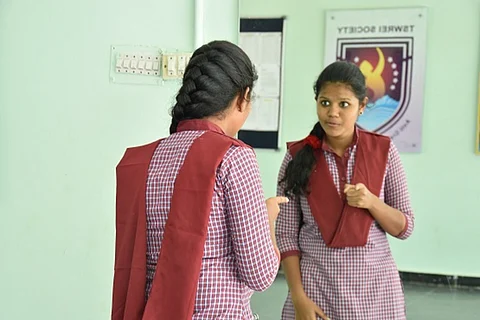

Public and stage speaking can be overwhelming and nightmarish for many students. They may be afraid each time they do it, and it's only with practice that the fear may reduce. While students in elite schools may get several opportunities for public speaking, that may not be the case for children from marginalised groups. Recognising the need to provide a platform for students to overcome their fear of public speaking, particularly in English, the Telangana Social Welfare Residential Educational Institutions Society (TSWREIS) is now running an initiative called Talkathon.
The residential welfare schools are run by Tribal and Social Welfare departments with an aim to impart quality education to students from the Scheduled Castes and other oppressed sections of the society. Most of the students come from an underprivileged background, with parents who depend on daily wages for their livelihood. In such circumstances, the Talkathon initiative is a huge help for scores of students to build their confidence levels and improve their language skills.
This initiative is the brainchild of the Residential Welfare Schools Chief Academic Monitoring Officer, George Varkey, who says this is the fourth version of their E-plus activities. “Talkathon is like a marathon, but here students are asked to speak as much as they can till their mind runs out of thoughts. Every student, based on their roll call, is given a chance to speak their minds on any topic that they choose,” says George.
Earlier, in 2013, E-plus activity versions included giving simple topics like 'my village,' 'my teacher' and so on. After two years, it was made more challenging with slightly difficult topics with guided comprehension, and later the students were introduced to topics such as same sex relationships, child marriage and so on in 2017. Now, with many students already equipped with speaking skills, they began Talkathon.
George Varkey adds that the teacher would note down the timing of each student with a stopwatch and give feedback once they are finished. And the student who scores the longest speaking time continuously would be awarded 'Talkathon champion of the day' in the next day’s assembly.
Talkathon in our schools is a roaring success. Thousands of poor kids like Nikhita of Moosarambagh school are practising non-stop speeches in their homes during lockdown. Hoping to see these kids as great leaders in future. Don’t give up guys. @Swaeroes4u #Talkathon pic.twitter.com/cHCesY8k7Q
— Dr. RS Praveen Kumar (@RSPraveenSwaero) July 17, 2021
Though this initiative was started just ahead of the pandemic, it came to a halt with the uncertainty in the curriculum through online education. However, the schools are now back with Talkathon, taking it to the homes of the students. Students are recording their Talkathon videos and sending it to the teachers now, according to the residential schools' management.
This Talkathon initiative is being implemented in all the residential welfare schools from class 6 to 12 during their club activities period, which is usually scheduled in the afternoon for at least 20 to 40 minutes in their respective classes.
Speaking to TNM, Likhitha, a class 10 student from the RK Puram branch of the residential schools, says, “In my 6th and 7th standard, I used to be very shy and was afraid of speaking to anyone. But through these activities, now I am able to speak my mind with the help of my teachers through guided comprehension and the opportunity to speak every day, through Talkathon.”
Meanwhile, since 2017, the Mirror programme has also been in place. “We place mirrors in the school campuses where children frequently move during their break times, like corridors and play areas. Students were asked to look into the mirrors and speak their mind so that it helps them in posture correction and improve their confidence levels. And this is applicable for teachers as well, as we placed mirrors in staff rooms for teachers to improve their skills. This has given encouraging results,' says George.